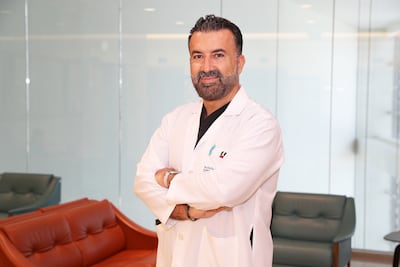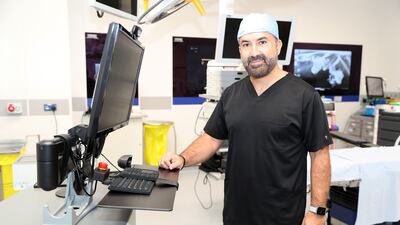A high-frequency ultrasound to kill off prostate cancer is to be used in Dubai for the first time in a move that will pave the way for less invasive treatments.
The high-intensity focused ultrasound (HIFU) is to be delivered to a select group of men, whose symptoms and medical profile make them more suitable for the alternative treatment than surgery or radiation therapy.
Prostate cancer can be difficult to treat, with often no symptoms in their early stages leaving some patients facing few alternatives to traditional treatment methods once the cancer has progressed.
Common side effects after prostate removal include incontinence and erectile dysfunction, while radiation treatment can bring fatigue, as well as bowel and bladder problems.
consultant uro-oncologist at Burjeel Medical City
High-frequency sound waves delivered by the $600,000 machine will precisely target and destroy cancerous tissue offering fewer side effects, better quality of life and faster recovery, experts said.
Although expensive, the treatment is due to be given to the first patients this month, at the Clemenceau Medical Centre Hospital in Dubai.
Professor Rabii Madi, a consultant urologist and expert in robotic surgery at CMC in Zabeel, said the treatment will become more widely available in the future.
“We are the first in the Arab world to launch this (Sonablate) treatment, so it’s very new here,” he said.
“The Sonablate machine will focus the ultrasound waves to target prostate cancer cells.
“This is used for patients with localised prostate cancer, and can only be used in men in a low-risk group or intermediate-risk group.
“Not every man with prostate cancer is a candidate, so it is my job to select patients who qualify.”
Precision therapy
The same precision therapy is already used in about 60 nations, with a similar Focal One High-Intensity Focused Ultrasound (HIFU) treatment for prostate cancer introduced at the Cleveland Clinic Abu Dhabi earlier this year.
A long-term study of outcomes on men who used the therapy was published in 2022 in the journal of European Urology.
The health of 1,379 men in the UK with an average age of 66 who used the HIFU therapy was checked for at least five years post-treatment.
Failure-free survival – the definition used by medics to assess how successful treatment has been with no further evidence of disease or therapies – was seen in 68 per cent of patients, seven years after HIFU was delivered.
“In terms of cancer control, HIFU is comparable in outcomes and cost to surgery and radiation, at least based on the studies done to date,” said Dr Madi, who hopes the treatment will eventually be routinely covered by insurance.
“But of course, it is not for every man as some patients will have aggressive cancers.
“We have had training in the UK and also a team from the US has visited to train other staff and nurses. Hopefully, we will have the first case in the UAE at the end of June.”
Prostate cancer is the most common form of the disease in men, affecting about one in eight adult males and twice that number in men of African descent.
According to the WHO’s Global Cancer Observatory, prostate cancer accounts for 11.9 per cent of all cancer in UAE men – the second most common form of the disease in the country, behind colorectal cancer (13.3 per cent).

Survival rates
While survival rates are high, prostate cancer can be difficult to detect in its early stages with few or even no symptoms.
This can delay treatment, increasing the risk of cancer developing further and the need for more aggressive therapy.
Dr Rishikesh Pandya, is a consultant uro-oncologist at Burjeel Medical City where robotic surgery is used to treat men.
“It is difficult to get rid of the cancer completely without surgically removing the prostate, usually by robotic-assisted laparoscopy,” he said.
“We tend to use robotic surgery in younger males, and radiation for older patients.
“This kind of surgery gets rid of the cancer, without damaging sexual function by saving the nerves which can be impacted.
“HIFU has been studied and evaluated over years in comparison to mainstream treatments and surgery.
“It is not yet offered as a primary line of treatment, as there is a chance of resurgence of the cancer which would then also need surgery or radiation.”
The most common test for prostate cancer is a PSA blood test in men over 40, which measures antigens that could signal abnormalities.
A reading above 2.5 ng/ml is considered abnormal and would usually lead to follow-up tests, a biopsy or an MRI scan to confirm a diagnosis.
However, about 10-12 per cent of men will receive a false positive, leading some to have further, unnecessary invasive tests.
Spit test
Research is under way into how a simple spit test could provide a more effective, cheaper alternative to a PSA.
DNA extracted from saliva – called a polygenic risk score – was found to be a better tool for accurately detecting prostate cancer by The Institute of Cancer Research, London, and The Royal Marsden NHS Foundation Trust.
Further tests are under way in 300,000 men in Britain to see how the test could be more widely used in those with the highest genetic risk.
“These saliva tests are done with random genetic material profiling,” said Dr Pandya.
“They are still under clinical trials and not yet recommended under any other guidelines for cancer diagnosis anywhere in the world.
“If there is a strong family history of prostate cancer, these kinds of tests are suitable, but a PSA test can be done in anyone over the age of 50.”


